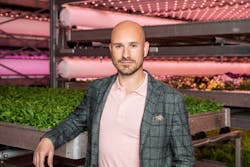If you want to grow commercial vegetables in Iceland, it wouldn’t be a bad idea to build a naturally lit greenhouse and pump in some of the country’s ample geothermal heat. Better yet, says Andri Björn Gunnarsson, build a windowless vertical farm, and pump up the LEDs.
That’s what Gunnarsson and his company Vaxa have done.
Working with lighting provider Signify, Vaxa is growing lettuces, greens, and herbs across 17,200 ft2 stacked up and down six layers of racks in a 16.5-ft-high facility in Lambhagavegur, about 8 miles east of Reykjavik.
The crops never see the sun while they grow.
Rather, they get their photons from Signify’s Philips GreenPower LED fixtures mounted roughly 10 to 12 in. above the plants. At that distance, conventional high-pressure sodium lighting would be unsuitable, because as a less efficient light source than LED, it would emit excess heat that would damage the plants.
Vaxa, founded in 2017, started construction of the 10,800-ft2 facility in 2018, planted and lit its first run on three layers later that year, and started delivering produce to market in February 2019. It subsequently lit and planted the other three layers, all in 2019.
Neither Signify nor Vaxa would reveal exactly how many lights Vaxa has installed, or how much Vaxa paid for the luminaires. The companies also did not quantify the yields, but they indicated that the results have been encouraging.
“Less than five years after launching, Vaxa is steadily producing lettuce heads, baby greens, microgreens, and herbs that it sells to restaurants, caterers, and retailers,” Signify said in a press release, adding that Vaxa also supplies consumers via a weekly box scheme.
Vaxa is using a static light recipe, rather than a changing one, a setup that is not uncommon at vertical farms such as Fifth Season near Pittsburgh and GoodLeaf Community Farms in Guelph, Canada.
Vaxa is now looking to expand its operations. Not only is vertical farming helping to chip away at Iceland’s reliance on imports for vegetables, but, as Gunnarsson’s partner and Vaxa co-founder Andri Gudmundsson, it is also key to helping provide food to the world. Vertical farming cuts down on land requirements and allows year-round growing even in sun-deprived areas of the world.
“We need smarter ways than we currently have to produce food for a lot more people,” said founder and CEO Gunnarsson.
“Indoor farming alone will not heal or repair the negative impact from global food production on the world, but it will play a key role in the future and help make agriculture a better and more sustainable business,” noted his partner Gudmundsson. “For you and me to continue living on the planet, we need to develop these new technologies today in order for the entire human population to have enough food in the future. It’s a race against time and we are determined and dedicated to the task at hand.”
Signify added that Vaxa can grow 10 times more produce than a greenhouse and 100 times more than a traditional farm.
Being in Iceland, the farm also comes with the environmental benefit of using CO2-free electricity, as Iceland generates about 75% of its electricity using hydropower (which is renewable as long as Iceland’s melting glaciers last) and about 25% from geothermal sources.
MARK HALPER is a contributing editor for LEDs Magazine, and an energy, technology, and business journalist ([email protected]).For up-to-the-minute LED and SSL updates, why not follow us on Twitter? You’ll find curated content and commentary, as well as information on industry events, webcasts, and surveys on our LinkedIn Company Page and our Facebook page.

Mark Halper | Contributing Editor, LEDs Magazine, and Business/Energy/Technology Journalist
Mark Halper is a freelance business, technology, and science journalist who covers everything from media moguls to subatomic particles. Halper has written from locations around the world for TIME Magazine, Fortune, Forbes, the New York Times, the Financial Times, the Guardian, CBS, Wired, and many others. A US citizen living in Britain, he cut his journalism teeth cutting and pasting copy for an English-language daily newspaper in Mexico City. Halper has a BA in history from Cornell University.






